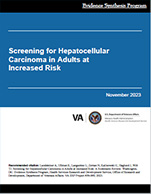
|
Recommended citation: |
Download PDF: Complete Report, Executive Summary, Report, Appendices
Despite a preponderance of observational studies, evidence was very uncertain regarding the effectiveness and harms of hepatocellular carcinoma (HCC) screening in adults at increased risk. Evidence was also very uncertain regarding comparative effects of different screening strategies including imaging modalities, intervals, and biomarkers.
HCC is common and a leading cause of cancer deaths. Individuals at increased HCC risk and considered targets for screening include those with cirrhosis or hepatitis B infection. Screening is primarily with imaging (ultrasound, computer tomography, or magnetic resonance imaging) with or without alpha-fetal protein (AFP). Uncertainty exists regarding screening effectiveness, harms, costs, and burden as well as comparative effectiveness of screening strategies. We conducted a systematic review to examine the effectiveness of screening versus no screening and comparative effectiveness and harms of different screening modalities, intervals, and biomarkers among individuals at increased risk of developing HCC.
The available evidence is substantial in quantity but has important methodological limitations precluding reliable assessment of screening effectiveness and harms. Most studies analyzed only individuals already having HCC, thus missing the intended target population for screening. Major methodological issues that limit certainty include a combination of lead- and length-time bias and little controlling for confounders known to affect receipt of screening and survival. We found very little data from studies that could provide more reliable information (cohort, case-control, randomized controlled trials [RCTs]) regarding screening among individuals at risk for HCC. Among these studies, methodological concerns or inconsistent findings severely limited conclusions. A VA RCT is comparing ultrasound+AFP with abbreviated MRI but will not address screening effectiveness. Evidence gaps could be closed with RCTs comparing screening with no screening, and higher methodological quality observational studies. Until methodologically higher quality studies are completed, the current uncertainty challenges HCC screening implementation and patient-clinician decision-making.
Screening for Hepatocellular Carcinoma in Adults at Increased Risk - Management eBrief